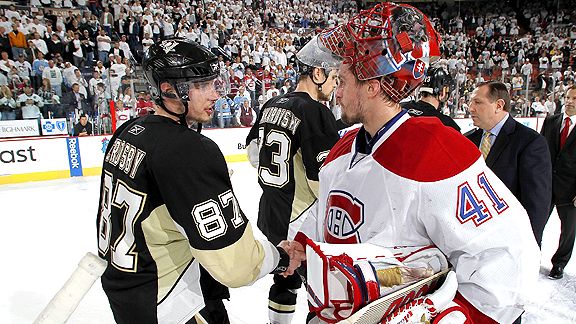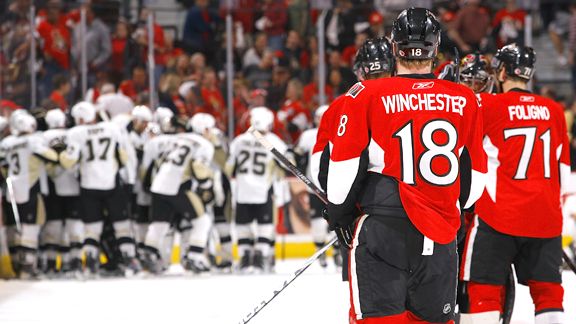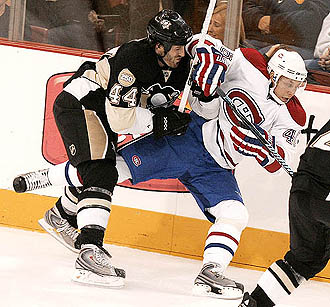Pittsburgh Penguins Season Review

It was definitely unexpected when the Montreal Canadiens came back against the powerhouse Washington Capitals, led by 50 goal scorer Alexander Ovechkin in the first round of the 2010 Stanley Cup Playoffs. They were down 3 games to 1 when the Canadiens defence, especially a young man named P.K. Subban and a forward named Mike Cammaleri came back against the Capitals to eliminate the Capitals in seven games. But, the real excuse for the Canadiens attack in the playoffs was goaltender Jaroslav Halak. The Slovakian netminder pulled a beautiful performance that showed the National Hockey League who the real starter was in Montreal, over former heralded goaltender Carey Price, named the second coming of Saint Patrick, Hall of Famer Patrick Roy.
Next up was the defending Stanley Cup Champions, who came in fourth place in the Eastern Conference Finals behind Washington, the New Jersey Devils and the Buffalo Sabres. Pittsburgh added high flying winger Alexei Ponikarovsky and Jordan Leopold at the trade deadline. Ponikarovsky comes in to rescue Evgeni Malkin from his recent slump, giving him a winger to adjust to and hopefully work with like he did with Petr Sykora prior to him leaving via free agency. Leopold adds depth to their defensive corps as a solid bottom 4 defenseman.
Sidney Crosby finished the season on a high note, especially with a 5 points effort vs the New York Islanders in the season ending game, which pushed him to 109 points to tie him at second place in the NHL points standing with Alex Ovechkin. Vancouver Canucks center Henrik Sedin won the Art Ross Trophy for the leader in points with 112 points, but led the league in goals with Tampa Bay Lightning center Steven Stamkos with 51 goals. Ovechkin fell behind with only 50 goals, failing to score on his last game. Crosby finished top 10 in 6 different categories, 1<SUP>st</SUP> in goals, 8<SUP>th</SUP> in assists, 2<SUP>nd</SUP> in points, 6<SUP>th</SUP> in powerplay goals, 10<SUP>th</SUP> in game-winning goals and 5<SUP>th</SUP> in shots.
Crosby’s mindset was to shoot more, influenced by his excellent playoffs that had him scoring 13 goals and 31 points, a career high in both
categories.
He has his career high in shots with 298 shots; his previous high was from his rookie year, where he had 278 shots. The Pittsburgh Penguins was 4<SUP>th</SUP> in the Eastern Conference, 2<SUP>nd</SUP> in the Atlantic Division. In 5<SUP>th</SUP> place, was, who else, but the Ottawa Senators.
Next up was the defending Stanley Cup Champions, who came in fourth place in the Eastern Conference Finals behind Washington, the New Jersey Devils and the Buffalo Sabres. Pittsburgh added high flying winger Alexei Ponikarovsky and Jordan Leopold at the trade deadline. Ponikarovsky comes in to rescue Evgeni Malkin from his recent slump, giving him a winger to adjust to and hopefully work with like he did with Petr Sykora prior to him leaving via free agency. Leopold adds depth to their defensive corps as a solid bottom 4 defenseman.
Sidney Crosby finished the season on a high note, especially with a 5 points effort vs the New York Islanders in the season ending game, which pushed him to 109 points to tie him at second place in the NHL points standing with Alex Ovechkin. Vancouver Canucks center Henrik Sedin won the Art Ross Trophy for the leader in points with 112 points, but led the league in goals with Tampa Bay Lightning center Steven Stamkos with 51 goals. Ovechkin fell behind with only 50 goals, failing to score on his last game. Crosby finished top 10 in 6 different categories, 1<SUP>st</SUP> in goals, 8<SUP>th</SUP> in assists, 2<SUP>nd</SUP> in points, 6<SUP>th</SUP> in powerplay goals, 10<SUP>th</SUP> in game-winning goals and 5<SUP>th</SUP> in shots.
Crosby’s mindset was to shoot more, influenced by his excellent playoffs that had him scoring 13 goals and 31 points, a career high in both
categories.
He has his career high in shots with 298 shots; his previous high was from his rookie year, where he had 278 shots. The Pittsburgh Penguins was 4<SUP>th</SUP> in the Eastern Conference, 2<SUP>nd</SUP> in the Atlantic Division. In 5<SUP>th</SUP> place, was, who else, but the Ottawa Senators.

The Penguins had previously played the Senators in the first round of the playoffs 3 times in the past four seasons. This time, the Senators were without Dany Heatley, who requested a deal at the beginning of the season and was dealt to the San Jose Sharks, and the Penguins were without Marian Hossa, who left the Penguins for the Cup Champions the Detroit Red Wings, who got his money’s worth, losing to the very same Penguins in seven games as the Penguins acquired their third franchise Stanley Cup.
Sidney Crosby has the playoff series to match his series the previous playoffs against the Capitals, leading the Penguins to a 6 game series win over the rival Senators. Crosby led the way with magnificent playmaking skills as well as scoring in tight situations. Pascal Dupuis and Evgeni Malkin also played vital roles in the beating the Senators.
Next up was the underdog Montreal Canadiens that had just uprooted the number 1 seed Washington Capitals. It was definitely a playoff for upsets, as the Penguins were the highest seed advancing in the Eastern Conference. Montreal beat Washington, Philadelphia beat New Jersey and Boston beat Buffalo. The Canadiens job were to shut down the Crosby/Malkin duo, a task almost every team takes on and a task that every team fails. Head Coach Dan Bylsma runs Sidney Crosby and Evgeni Malkin on separate lines, spreading out their super stardom in hopes of tiring out the defence in their valiant efforts of slowing the attack. Then there is determined third line center Jordan Staal and clutch scorer Maxime Talbot, along with a talented defense led by Sergei Gonchar, Kris Letang and Alex Goligoski.
The Canadiens proved that upsetting the Washington Capitals was no fluke, and that they were in it to win it. The Penguins doubled up on the Canadiens with a 6-3 victory. Sidney Crosby had 2 assists and Evgeni Malkin had 1 assist. Kristopher Letang had a goal and assist. Gonchar, Staal, Adams and Goligoski were the other goal scorers. Subban, Cammaleri and Gionta scored for Montreal. Halak played better the next game with a 3-1 victory. He tipped in with 38 saves on 39 shots, Gionta scored once and Cammaleri scored twice for Montreal. Matt Cooke scored the lone goal for Pittsburgh.
They came back the next game, with a 2-0 shutout in Game 3 with third period goals from Malkin and Dupuis. Marc-Andre Fleury didn’t have much work to do, as he only needed to make 18 saves. A late period rally in Game 4 had the Penguins losing 3-2. Goals came from Talbot and Kunitz for Pittsburgh and Pyatt, Lapierre and Gionta. The Penguins took the series lead, with a 2-1 victory. Crosby was held off the scoresheet with Letang and Gonchar scoring the goals.
Cammaleri’s 2 goal night pushed the series to a Game seven, as the Canadiens won the game 4-3. Crosby had a goal and an assist while Spacek returned from injury with a goal. Then Game seven didn’t finish exactly to plan, with a 5-2 loss. Crosby took an early penalty that led to a fluke goal by Brian Gionta. Jaroslav Halak had a 37 save performance, as the Canadiens upset the Penguins. And it was the end to the Mellon Arena. The Penguins’ arena since they entered the league in 1967 was their home while their successor, the Consol Energy Center, was being built.










Comment